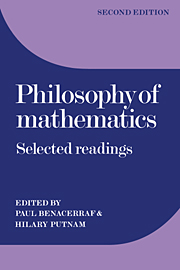Book contents
- Frontmatter
- Contents
- Preface to the second edition
- Introduction
- Part I The foundations of mathematics
- Symposium on the foundations of mathematics
- Disputation
- Intuitionism and formalism
- Consciousness, philosophy, and mathematics
- The philosophical basis of intuitionistic logic
- The concept of number
- Selections from Introduction to Mathematical Philosophy
- On the infinite
- Remarks on the definition and nature of mathematics
- Hilbert's programme
- Part II The existence of mathematical objects
- Part III Mathematical truth
- Part IV The concept of set
- Bibliography
On the infinite
Published online by Cambridge University Press: 05 June 2012
- Frontmatter
- Contents
- Preface to the second edition
- Introduction
- Part I The foundations of mathematics
- Symposium on the foundations of mathematics
- Disputation
- Intuitionism and formalism
- Consciousness, philosophy, and mathematics
- The philosophical basis of intuitionistic logic
- The concept of number
- Selections from Introduction to Mathematical Philosophy
- On the infinite
- Remarks on the definition and nature of mathematics
- Hilbert's programme
- Part II The existence of mathematical objects
- Part III Mathematical truth
- Part IV The concept of set
- Bibliography
Summary
As a result of his penetrating critique, Weierstrass has provided a solid foundation for mathematical analysis. By elucidating many notions, in particular those of minimum, function, and differential quotient, he removed the defects which were still found in the infinitesimal calculus, rid it of all confused notions about the infinitesimal, and thereby completely resolved the difficulties which stem from that concept. If in analysis today there is complete agreement and certitude in employing the deductive methods which are based on the concepts of irrational number and limit, and if in even the most complex questions of the theory of differential and integral equations, notwithstanding the use of the most ingenious and varied combinations of the different kinds of limits, there nevertheless is unanimity with respect to the results obtained, then this happy state of affairs is due primarily to Weierstrass's scientific work.
And yet in spite of the foundation Weierstrass has provided for the infinitesimal calculus, disputes about the foundations of analysis still go on.
These disputes have not terminated because the meaning of the infinite, as that concept is used in mathematics, has never been completely clarified. Weierstrass's analysis did indeed eliminate the infinitely large and the infinitely small by reducing statements about them to [statements about] relations between finite magnitudes. Nevertheless the infinite still appears in the infinite numerical series which defines the real numbers and in the concept of the real number system which is thought of as a completed totality existing all at once.
- Type
- Chapter
- Information
- Philosophy of MathematicsSelected Readings, pp. 183 - 201Publisher: Cambridge University PressPrint publication year: 1984
- 17
- Cited by

